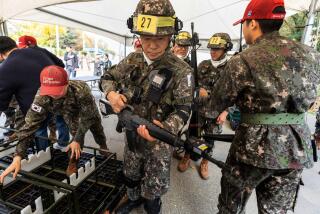Some Never Made It Home for Christmas : Korean War: Their winters were just as cold, their fighting just as arduous as any war’s, but they were the forgotten soldiers.
- Share via
We sleep in Arlington, forgotten soldiers who died in a forgotten war.
It was cold in Korea that Thanksgiving of 1950 and the GI’s joked as the hot turkey drumsticks turned into Popsicles before they could be eaten. Still, it was a traditional Thanksgiving meal, and we had been promised that we would be home for Christmas. The turkey dinner made the barren Korean hills seem a little less desolate and perhaps a little more like Iowa and Kentucky or wherever there were families at holiday time.
We moved out for the North, proud warriors who, in just five months, had saved South Korea from communist attack, pushed back the North Korean army and made an “end run” landing at Inchon. We had gone into combat as civilians hurriedly pushed through training, reservists who were converted from weekend warriors to the real thing. Now we were combat veterans. We were the first to confront the communists with arms; the first to fight under the pale blue U.N. flag.
Gen. Douglas MacArthur ordered the final drive north of the 38th Parallel in spite of misgivings in Washington. He promised his troops that this drive would end the Korean War and that we would be “home for Christmas,” a battle cry not quite as dramatic as “I shall return” but still, good for a headline. But what MacArthur didn’t tell us was that his own intelligence reports were describing a massive buildup of the Chinese People’s Army just beyond the Yalu River and that advance units had already crossed into Korean territory. The GI’s were marching into a trap and the high command knew it.
In December, the Chinese attacked in force. Bugle-blowing infantry charged in waves, overrunning U.N. positions all along the front lines. At Chosin Reservoir, 15,000 of us, 1st Marines along with British and Korean units, were entirely cut off and outnumbered. Lt. Gen. Ned Almond, 10th Corps commander, flew in from Tokyo and conferred with Maj. Gen. Oliver Smith, the 1st Marine commander. Almond advised Smith to destroy his artillery, burn his supplies and order us to flee on foot, every man for himself. Stunned, the Marine commander refused and made plans to fight our way out of the trap. He told news correspondents that he was not going to retreat, that he was merely going to “attack in another direction.”
We moved south in bitter cold made deadly by a fierce Siberian wind. Under constant attack, we began to take heavy casualties. Of the 15,000 troops who fought at bloody Chosin, 12,000 were wounded or dead before we reached U.S. lines.
We fought south to Hagaru, then Chinhung-ni, where we linked up with an advance relief column. Then we moved on to Hungnam, where the cruiser Rochester and a squadron of destroyers covered the evacuation with a ring of fire. The pitiful village of shacks was destroyed by salvos from the naval guns. The ships ghosted out of the black harbor.
It was Christmas Eve.
The war dragged on for three more years while we died at Kansong and Porkchop Hill and in dozens of other engagements. MacArthur was fired by President Truman, but returned to the United States to receive a hero’s welcome. All the while, the coffins were arriving in Riverside, the Punch Bowl and Arlington. Some of us were buried not far from where we fell: the U.N. cemetery in Pusan. There were no parades, but there was an honor guard and a bugler and the presentation of a folded American flag.
We sleep in Arlington, brave warriors who died in a long-ago war. On the grass next to the Lincoln Memorial, across the Potomac in Washington, a monument is finally rising. After four decades, America is remembering us--30,000 brave young men who never made it “home for Christmas.”
More to Read
Sign up for Essential California
The most important California stories and recommendations in your inbox every morning.
You may occasionally receive promotional content from the Los Angeles Times.










